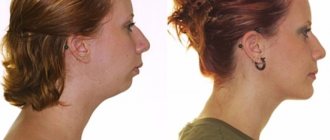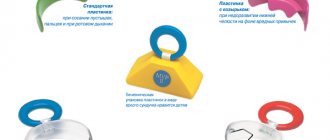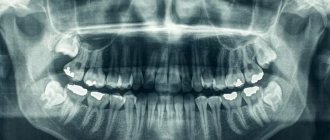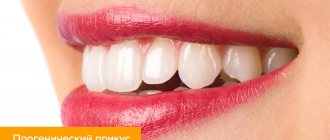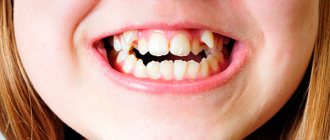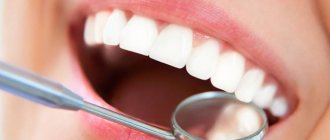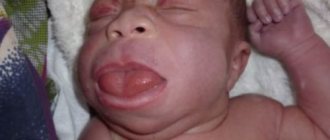Dental practice confirms that most people's bite is not ideal. Sometimes parents pay attention to this problem from the first years of a child’s life, children of less attentive parents turn to orthodontic treatment when they reach adulthood, while many, attributing the problem solely to aesthetic imperfections, prefer to ignore it altogether.
In fact, in addition to a visual defect, an incorrect bite can cause various dental problems, and often leads to permanent injury to the tongue and the inside of the cheek. This last inconvenience is very painful, and we will talk about it in this article, looking in detail at how to protect yourself from the problem, what to do if an injury has already been received, and what kind of bite is called incorrect.
What is “bad bite”
Bite (or occlusion) is the closing of the jaws at the moment of their natural compression. The standard is considered to be central occlusion, in which the number of points of contact between the teeth of the upper and lower jaws is maximum.
But all other options for interaction of the jaws when closing are malocclusions. Today it is customary to identify the main forms of malocclusion:
- open: there is no tight closure of the dentition
- cross: the antagonist teeth of the upper and lower jaws overlap each other with segments (in one area the lower ones overlap the upper ones, in the other - vice versa)
- mesial: the lower jaw protrudes forward, the upper teeth overlap the lower ones
- distal: the upper row of teeth is pushed forward, overlapping the lower one,
- deep: a type of distal bite when the upper jaw almost completely hides the lower teeth.
Contrary to the opinion of many people who believe that malocclusions are not a cause for concern, you should know: malocclusion of any form in most cases causes dental problems, and sometimes problems of a different nature.
The absence of several teeth and loose jaw closure can provoke:
- deterioration of the gastrointestinal tract;
- frequent headaches;
- development of facial asymmetry;
- premature appearance of facial wrinkles.
An incorrect primary bite can affect the growth of permanent teeth and lead to even greater deformation of the jaw system.
And very often, malocclusions cause permanent injury to the mucous membrane, including a strong bite of the tongue and the inner surface of the cheek. And the presence of open wounds in the oral cavity is a direct path to infection and the development of inflammation.
Don’t leave the problem unattended, contact your orthodontist on time!
Rule four: help your baby cope with pain
What to do if a child bites his tongue? Make sure that your baby has a minimum of discomfort after this unpleasant moment, because his tongue is not only damaged, but also very painful. Apply any gel to the mucous membrane that is suitable for sore gums during difficult teething. For example, “Kamistad Baby”, “Kalgel”. You can also give your child Nurofen or Panadol, Viburkol - these medications will comprehensively help relieve anxiety, prevent the appearance of fever, and reduce pain.
Painkillers will help your child survive the problem.
“My daughter recently lost all her eye teeth, and against this backdrop, a real nightmare began at home. She bit her entire tongue, sores and grooves appeared on it, the whole tongue was red. We went to the pediatrician, and she told me to use only Stomatidin for prevention and observe, supposedly, my daughter will get used to the new sensations from the grown teeth and it will pass. And I’m afraid that it will become like a bad habit!”
Sofia R., from correspondence on komarovskiy.net
But products such as Lidocaine or eye drops (some sometimes use them for other purposes and even recommend them as a topical anesthetic), which are in the home medicine cabinet, should not be used. These adult medications have many contraindications, have side effects and should not be swallowed, and rarely can any child not swallow saliva and sit motionless with their mouth open until the medicine takes effect.
Why does malocclusion form?
Statistics show that 90% of people have some signs of occlusion; The root cause of anomalies is considered to be genetics. However, heredity is far from the only factor.
According to orthodontic experts, the following factors influence the formation of the dentofacial apparatus in children:
- artificial feeding: when breastfeeding a newborn, the jaw apparatus is formed more correctly, while the habit of sucking a pacifier inherent in “artificial babies” affects the process negatively;
- difficulty changing teeth: loss of baby teeth too early or, conversely, with a delay can affect the health of the jaw apparatus;
- injuries, untreated caries, inflammatory gum diseases (all this is fraught with jaw displacement).
A child’s habit of sucking their thumb in their sleep can also lead to malocclusion in the future. But for adults, the greatest danger is the loss of teeth: the absence of even one unit in the dentition can lead to a violation of the load distribution, as a result - to deformation of the occlusion (this is another argument in favor of dental implantation, and the dentition must be restored as quickly as possible - before a problem such as malocclusion appears).
Rule seven: pay attention to the complex of concomitant diseases
As experts say, injuries to the tongue, as well as to the inside of the cheeks and lips, do not always occur in a child due to activity and restlessness. Sometimes they indicate the presence of some undetected diseases, especially if the situation repeats itself again and again. For example, the cause may be the presence of bite pathologies, abnormal attachment of the frenulum of the tongue, paresthesia (decreased sensitivity of nerve receptors). In the first two cases, an orthodontist, dentist, or pediatric surgeon will help solve the problem. If you have paresthesia, you will need to visit a neurologist, endocrinologist, and other specialists.
Notice
: Undefined variable: post_id in
/home/c/ch75405/public_html/wp-content/themes/UltraSmile/single-item.php
on line
45 Notice
: Undefined variable: full in
/home/c/ch75405/public_html/wp-content /themes/UltraSmile/single-item.php
on line
46
Rate this article:
( 4 ratings, average: 3.75 out of 5)
language
First aid
If the tongue or the inside of the cheek is bitten, two problems arise at once:
1. Stop bleeding
solution: rinse your mouth with cold water, if possible, apply ice (cooling helps to constrict blood vessels)
If you cannot stop the bleeding on your own, you must immediately consult a doctor!
2. Pain relief
solution: cold also relieves pain, but if the pain is severe, treat the area with a special “freezing” spray or take a painkiller tablet
Consequences of untimely treatment of frequent tongue biting:
- Formation of a tuberculous ulcer (painful, uneven yellow ulcer);
- Development of leukoplakia (keratinization of the oral mucosa);
- Formation of a cancerous tumor (a compaction in the center of the ulcer that does not heal and can spread to neighboring areas of tissue).
Important! Under no circumstances should you wash open wounds with decoctions or solutions yourself - you risk not only aggravating the pain, but also causing an infection.
How to speed up wound healing
All wounds heal sooner or later - this is understandable, but the duration of healing largely depends on your actions. How to behave so that the injured mucous membrane heals as quickly as possible and without consequences? Some valuable tips for this case:
- pay increased attention to oral hygiene - this will help avoid infection of an open wound (regular brushing of teeth, careful removal of food debris and bacterial plaque);
- observe the temperature regime, avoid excessively hot or chilled foods for a while: cold is good only as an emergency measure, but subsequently it slows down the healing process; hot food and drinks both irritate and injure damaged tissues;
- use external antiseptics (sprays, ointments, lozenges): the pharmacist at the pharmacy will help you with the choice, ideally you should consult a doctor;
- rinse your mouth with decoctions of medicinal herbs: the best for these purposes are chamomile and St. John's wort;
- increase the proportion of foods with vitamins B and C in your diet, which promote wound healing; To heal scratches on the mucous membrane, use ascorbic acid.
Use the advice of traditional medicine with caution: rinsing with medicinal decoctions is not so harmless, you can resort to their help only with the permission of a doctor!
Comprehensive treatment and guarantee of quality results
Dental clinic "VTV" offers a full range of services for the diagnosis and treatment of oral diseases. You undergo a full examination after the first consultation with specialists. Timely treatment allows you to avoid tooth extraction and subsequently prevent the recurrence of the disease.
We offer comfortable conditions for treatment and guarantee flexible prices for all center services. In particular, you can save now by making an appointment through the website with a 10% discount. Our specialists will do everything to make your smile your next pride!
Radical solution to the problem
If cheek and tongue biting occurs regularly, the only way to get rid of the problem once and for all is to see a dentist. The specialist will examine the cause of the problem and, based on reality, will suggest:
- restoration of damaged teeth, removal of hopelessly damaged teeth, restoration of the correct distribution of chewing load through prosthetics or implantation;
- grinding of sharp edges of teeth that injure the mucous membrane;
- removal of wisdom teeth (if the dentition is displaced due to them);
- orthodontic treatment (plates, trainers, aligners, braces, etc.)
Rinse recipes
To clean the wound and prevent infection, you should use a mouth rinse. This procedure will be carried out especially if the tongue was bitten while eating. After rinsing your mouth, you need to spit; if there is blood, rinse your mouth several times. Below are the most popular remedies that you can prepare at home:
Saline solution. You will need a glass of water, you can use tap water, but preferably warm. Pour a spoonful of salt into it and stir the mixture. It is recommended to rinse your mouth with this solution for about fifteen seconds and then spit it out. You should rinse at least three times until the wound heals. This procedure is especially effective if used immediately after meals. Salt has the quality of killing harmful bacteria in the mouth. In addition, thanks to this procedure, the wound is cleaned well and the risk of infection is reduced.
Hydrogen peroxide. To prepare this rinse, you need to mix three percent hydrogen peroxide and water in equal parts. With the same duration as in the previous recipe, rinse and spit. When performing the procedure, be careful not to swallow the solution. You can rinse with hydrogen peroxide three to four times a day. It is considered an excellent antiseptic and copes well with the growth of bacteria in the mouth. In addition, peroxide will perfectly clean the wound, remove dirt from it, and also ensure the delivery of the required amount of oxygen to the cells, which, in turn, will help stop bleeding. This rinse can also be in the form of a gel, very convenient for lubricating the wound, all you need is a cotton swab and a swab.
Antacid. To prepare the mixture, you will need to take equal proportions of Benadryl - an antiallergic liquid and an antacid, for example milk of magnesia, and mix everything. Rinse for a minute and then spit. Can be performed up to two times. Antacids help lower acid levels in the mouth, which improves healing. Antihistamines will reduce inflammation. The mixture of these products creates a unique and effective rinse. You can prepare the mixture in the form of a paste; this is mainly convenient for those who cannot rinse their mouth for one reason or another and apply it to the wound.
Regular rinses. To perform the procedure, you need to take the dose that is usually recommended and rinse for at least half a minute. It is necessary to use rinses after eating. This will help cleanse the wound of food debris, protect against infection and speed up the healing process. You can also use products such as benzydamine hydrochloride for rinsing. The main thing is that everything is carried out strictly according to indications.
I bit my tongue: a sign by day of the week
For a more accurate interpretation of the sign, it is necessary to take into account the day when it happened:
- Monday - do not tell anyone about your planned activities, otherwise unforeseen situations may occur that interfere with the fulfillment of what you want. Tongue injury also predicts monetary gain.
- Tuesday. You cannot share someone else’s secret with anyone, so as not to harm yourself and lose the trust of loved ones. Perhaps you will soon meet old friends.
- Wednesday. Empty talk will lead nowhere. Excessive chatter is fraught with condemnation from others.
- Thursday. Expect intimate conversations with old friends and fun parties.
- Friday. You will encounter difficulties, conflicts, hassles, and loss of finances.
- Saturday. They slander you, spread rumors, and weave intrigues behind your back.
- Sunday. The day is considered unlucky for traveling for work. Excessive chatter will lead to troubles and quarrels in the family. You may encounter fraud, unprofitable investments.
According to some experts, superstition on Friday and Tuesday does not make sense, therefore it is interpreted according to other parameters.
Interpretation by time of day
When interpreting signs, one more parameter is taken into account - the time of day:
- morning - soon you will go on a trip;
- day - what you have long dreamed of will come true;
- evening - meeting with an old friend;
- night - expect guests.
Biting your tongue in a dream promises a deterioration in relationships due to a person’s reluctance to listen to his heart.
Perhaps you are holding a grudge, standing still and not moving forward. It is necessary to reconsider relationships with loved ones, change outdated views and principles, and get out of your comfort zone.
What happens if you bite the tip of your tongue, left and right
You want to balance your life, understand the difference between possibilities and dreams. The sign promises discord with your soulmate. You were forced into this relationship, without love, but you are unable to change anything.
Biting the tongue on the right side means a serious mistake. You made a mistake when making a decision, did not protect yourself, did not check the information received.
If you bite a muscle organ on the left side, you are embarrassed by feelings, for example, the desire to dominate someone. A bite on the left or right tells you that you can resolve the conflict by having an open conversation with the person.
Adviсe
For quick healing, if the patient bites his tongue, a strong immune system is necessary. Drink teas from plants that are rich in vitamin C. Excellent raw materials for these purposes can be, for example, rose hips, young shoots and leaves of raspberries and currants. You can also drink warm fruit drink made from berries such as strawberries, cranberries, and lingonberries. In short, during the treatment of a bitten tongue, the patient should not only eat carefully, but also eat foods rich in vitamins.
A significant part of tongue injuries are, as a rule, mechanical in nature, and this can only indicate the patient’s failure to comply with precautionary measures. It is not uncommon to bite your tongue while eating. To avoid such negative consequences, you should follow simple recommendations:
- do not get lost in thoughts when eating;
- do not be distracted while eating;
- do not talk with your mouth full;
- food should be chewed slowly.
By following all the above tips and recommendations, you will achieve speedy healing of your tongue.
When to see a doctor
Parents can usually eliminate the negative consequences of tongue biting themselves. But in some cases you cannot do without medical help.
Dangerous symptoms:
- the wound bleeds heavily, bleeding continues for more than 15 minutes;
- the damaged area has swollen, an extensive hematoma has formed;
- the size of the wound on the tongue is more than 5 mm, it is quite deep, or has uneven edges;
- pus appeared at the site of injury;
- the child bit through his tongue or bit off the tip;
- painkillers do not help;
- the tongue is swollen, there are seals on the surface;
- blue lips, convulsions are signs of painful shock;
- deterioration of general condition – fever, weakness;
- the wound does not heal for more than 4 days.
In such situations, the doctor will tell you how to treat the tongue. You may need to consult a traumatologist, dentist, or maxillofacial surgeon.
Without proper and timely treatment, serious complications can occur - extensive hematomas, infection of the tongue muscles, and the development of speech defects.
Pathogenic microorganisms enter the wound, which is fraught with the development of bacterial and viral pathologies.
How to treat?
During treatment, you should continue to use cold compresses. Prepare ice cubes in a plastic bag and freeze your tongue until the pain subsides. To make it more comfortable, you can wrap the bag with a damp, thin cloth. Try not to consume any acidic foods during this period. You can suck on fruit-based ice cream and drink cold drinks. In this way, it will be possible to stop the bleeding, even if it appears again, and also reduce pain during treatment. There are also other recipes for quick wound healing:
- aloe vera. This gel can be purchased at any pharmacy chain. Or use a living plant, for example, by cutting a leaf and collecting the pulp from it. Then use it as a compress, applying the pulp to the wound at least three times a day. It is advisable if this procedure is performed after rinsing the mouth and before going to bed. Aloe vera is a natural herbal remedy that can improve blood circulation. In addition, it has bactericidal properties and can suppress certain types of harmful bacteria. When using, be careful to prevent ingestion. This product can also be used in this way: take a small piece of bandage and put the gel on it, then apply it to the wound. Saliva will not dissolve it and this will extend the period of action of the gel.
- oral gel. It can also be purchased at any nearest pharmacy; it will effectively anesthetize and disinfect the wound. For example, Orajel, which comes in the form of a tube, is popular and convenient in this particular case. To carry out the procedure, just squeeze out a little gel and place it on a sterile cotton swab, then apply to the affected area. It is recommended to repeat the procedure two to four times until the wound begins to heal.
- adhesive paste. You can use this dental remedy. The effect of use is similar to oral gel. Place a little paste on a sterile cotton swab and then lubricate the wound. Repeat frequency up to four times a day. You don't have to bother putting the gel on the stick, just apply it with your finger. First wash your hands well with soap.
- baking soda. To prepare the product, you need to dilute a teaspoon of this product until you get a homogeneous paste. You should dip a stick with cotton wool wrapped in this paste and lubricate the affected area. Baking soda helps reduce acidity in the mouth and suppress bacteria, and also reduces swelling and pain when the inflammatory process begins.
- honey. This procedure is not only simple, but also pleasant. You need to take a teaspoon of the product and lick it, you can just drop some honey on the bite area. The frequency of the procedure is up to twice a day. Honey is an excellent remedy that has an enveloping effect. It will protect the mucous membrane, preventing the proliferation of harmful bacteria. It will only be beneficial if you add turmeric to honey, a pinch is enough. Turmeric is also an excellent antibacterial agent and will help suppress some harmful bacteria, which, when combined with honey, ensures that the wound heals faster.
- milk of magnesia This treatment method will especially bring a noticeable effect if used after the procedure of rinsing the mouth. Milk is an excellent active antacid. Using this method, the patient will be able to achieve not only the suppression of harmful bacteria, but also create a favorable environment for beneficial microorganisms. To carry out the procedure, soak a cotton swab in milk of magnesia and apply three to four times a day to the wound.
What to expect if you bite your tongue while eating
Every person has bitten a muscle organ at least once while eating. This may mean that you want to take on everything at once or are in a hurry to make a decision.
Other meanings of the sign:
- It symbolizes an aggravation in a relationship, a state when a person cannot understand why feelings are lost and a breakup is brewing. You need to approach love differently, turn all the negativity into something useful.
- For a girl, biting her tongue while eating means falling in love, passion, but the feelings will not last long. Sometimes superstition predicts a meeting with a blond man with light eyes. Courtship and flirting will not last long.
- If it hurts to bite your tongue, perhaps you are afraid of new relationships or acquaintances. Hermitage will help you rethink your feelings. Be alone with yourself, engage in spiritual or personal growth. This will be beneficial.
- Soon you will move to a new level in your relationship. Mutual efforts, common work, goals will help create renewed love.
Biting your tongue while eating promises protracted conflicts and quarrels over trifles. You need to remember the rules of etiquette and behave with dignity among people. Superstition indicates greed; a person is in a hurry to eat, forgetting about chewing food.
Signs
The main symptom is the child complains of pain. Examine your tongue carefully in good lighting. The fresh wound bleeds and is clearly visible.
A tongue injury may be indicated by the baby’s complaints about discomfort when eating hot, sour foods. If you carefully examine the tongue, you can see swelling and hematoma.
